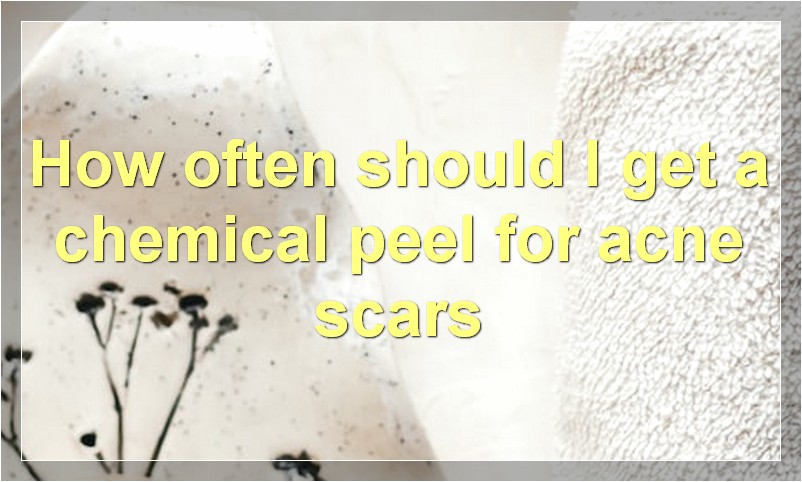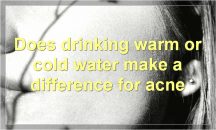If you’re struggling with acne scars, a chemical peel may be a good option for you. In this article, we’ll go over everything you need to know about chemical peels for acne scars, including what they are, how they work, and what to expect during and after the treatment.
What is a chemical peel
A chemical peel is a process in which a chemical solution is applied to the skin to remove the outer layer of dead skin cells, revealing the fresh, new skin underneath.
Chemical peels are used to improve the appearance of the skin by reducing wrinkles, fine lines, and age spots. They can also be used to treat acne scars and other types of scarring.
There are three main types of chemical peels: light, medium, and deep. Light peels are the most superficial and are typically used to treat mild skin imperfections. Medium peels penetrate deeper into the skin and are often used to treat more severe skin conditions such as acne scars or wrinkles. Deep peels are the strongest and can be used to treat deep wrinkles or extensive scarring.
The type of peel that is right for you will depend on your goals and the condition of your skin. A consultation with a board-certified dermatologist or plastic surgeon will help you determine which type of peel is best for you.
Light Peels
Light peels, also called superficial peels, use a weaker acid solution than medium or deep peels. The most common light peel is glycolic acid peel, which uses sugar cane-derived glycolic acid to exfoliate the outermost layer of the skin.
Glycolic acid peels can be done in a dermatologist’s office or at home using over-the-counter products. The results of a glycolic acid peel are usually temporary, lasting anywhere from a few days to a few weeks.
Other types of light peels include lactic acid peels and salicylic acid peels. Like glycolic acid peels, these can be done in a dermatologist’s office or at home using over-the-counter products.
Medium Peels
Medium peels penetrate deeper into the skin than light peels and use stronger chemicals, such as trichloroacetic acid (TCA) or phenol. TCA peels are most commonly used to treat wrinkles, sun damage, and acne scars. Phenol peels are the strongest type of medium peel and are typically used to treat deep wrinkles or extensive scarring.
Both TCA and phenol peels must be done in a dermatologist’s office or medical spa by a trained professional. The results of a medium peel can last for years, but the risks are greater than with light peels because of the potential for scarring and changes in skin color.
Deep Peels
Deep peels penetrate even deeper into the skin than medium peels and can only be done by a trained professional in a dermatologist’s office or medical spa. Because they use such strong chemicals, deep peels carry a greater risk for complications such as scarring and changes in skin color. However, they can provide more dramatic results that last for years.
What are the benefits of a chemical peel for acne scars

A chemical peel is a great way to improve the appearance of your skin, especially if you have acne scars. Chemical peels can help to:
-exfoliate the skin
-reduce the appearance of scars
-stimulate new skin growth
-improve skin texture
-even out skin tone
A chemical peel works by applying a solution to the skin that helps to loosen dead skin cells and promote new cell growth. The solution is usually made up of chemicals such as glycolic acid or trichloroacetic acid.
After the solution is applied, the dead skin cells will peel off, revealing newer, healthier skin cells underneath. In some cases, more than one treatment may be necessary to achieve desired results.
There are many benefits to getting a chemical peel, especially if you have acne scars. Chemical peels can help to exfoliate the skin, reduce the appearance of scars, stimulate new skin growth, and improve skin texture and even out skin tone. If you are considering a chemical peel, be sure to consult with a board certified dermatologist to see if it is right for you.
How does a chemical peel work
A chemical peel is a cosmetic treatment (typically administered by a dermatologist or licensed esthetician) that uses a chemical solution to improve the texture and appearance of the skin. The solution used in a chemical peel can vary depending on the desired results, but is typically an acid (like glycolic acid or trichloroacetic acid) that breaks down the top layer of skin cells.
During a chemical peel, the solution is applied to the face (or other area being treated) and left for a set amount of time before being neutralized and rinsed off. The length of time the solution is left on will determine how deep the peel is. A shallow peel will only remove the outermost layer of skin cells, while a deep peel will penetrate deeper into the skin.
After a chemical peel, the new skin that is revealed will be smoother and have a more even tone. Fine lines and wrinkles may be reduced, and acne scars can be minimized. Chemical peels can be done on the face, neck, chest, back, hands, or feet.
How long does a chemical peel take to work on acne scars
A chemical peel is a popular treatment for acne scars. The treatment involves applying a chemical solution to the skin, which removes the top layer of skin, revealing the new, unscarred skin underneath.
Chemical peels can be done at home or in a doctor’s office. The type of peel, the strength of the peel, and the person’s individual skin type will all affect how long it takes for the peel to work.
In general, light peels take about one week to work, while deeper peels may take two to four weeks. Some people may see results after just one peel, while others may need several peels to achieve desired results.
Are there any side effects of a chemical peel for acne scars
Acne scars are a common problem that can be frustrating to deal with. While there are many treatments available, some people opt for a chemical peel. But is this treatment right for you?
A chemical peel is a procedure in which an acid is used to remove the top layer of skin. This can help improve the appearance of acne scars by making them less visible.
There are different types of chemical peels, and the one that’s right for you will depend on the severity of your scars. A light chemical peel may be all that’s needed to improve the look of mild scars. A deeper peel, however, may be necessary to get better results.
As with any treatment, there are potential side effects of a chemical peel for acne scars. These can include:
-Redness and swelling
-Skin sensitivity
-Peeling skin
-Dryness
-Itching and burning
-Scarring
-Infection
Before undergoing a chemical peel, it’s important to talk to your doctor about the risks and potential side effects. This will help you make an informed decision about whether or not this treatment is right for you.
How often should I get a chemical peel for acne scars

When it comes to acne scars, there is no one-size-fits-all answer to the question of how often you should get a chemical peel. The frequency with which you undergo this treatment will depend on a number of factors, including the severity of your scars, your skin type, and your overall skin care goals.
That said, most dermatologists agree that for the best results, you should get a chemical peel every four to six weeks. This schedule will help to ensure that your scars are gradually and effectively reduced, while also giving your skin time to recover between treatments.
Of course, if you have very sensitive skin, you may need to space out your peels a bit more. In this case, your dermatologist can help you create a custom treatment plan that meets your needs.
No matter how often you get a chemical peel, be sure to follow all aftercare instructions carefully. This will help to ensure that your skin heals properly and that your results are long-lasting.
How much does a chemical peel for acne scars cost
The average chemical peel for acne scars costs between $600 and $900. The best way to determine the cost of your chemical peel is to schedule a consultation with a board-certified dermatologist or plastic surgeon who has experience performing the procedure. During your consultation, the dermatologist or plastic surgeon will assess your skin type, the severity of your acne scars and the size of the treatment area. Based on this information, they will be able to give you an estimate of the total cost of your chemical peel.
Is a chemical peel for acne scars painful
When it comes to acne scars, there are a variety of treatments available to improve their appearance. One option is a chemical peel, which can help to exfoliate the skin and reduce the appearance of scars. But is a chemical peel for acne scars painful?
Generally, chemical peels are not painful. However, you may experience some mild discomfort during the treatment as the chemicals are applied to your skin. You may also feel a burning sensation as the peel is applied, but this should only last for a few minutes. After the peel, your skin may be sensitive and you may experience some redness and swelling. These side effects should subside within a few days.
If you’re considering a chemical peel for your acne scars, talk to your dermatologist about what to expect and whether the treatment is right for you.
What are some other treatment options for acne scars
Acne scars are a common problem that can be difficult to treat. There are a number of different treatment options available, and the best approach may vary depending on the individual.
One option is laser resurfacing. This can be effective in reducing the appearance of acne scars, but it can be expensive and there is a risk of side effects such as burns and infections.
Another option is punch excision, which involves using a small punch tool to remove the scarred tissue. This can be effective, but it can also result in scarring.
Fillers are another option that can be used to help reduce the appearance of acne scars. Fillers can be injected into the skin to help fill in depressions and make the scars less visible. However, fillers can be expensive and there is a risk of side effects such as allergic reactions.
Acne scars can also be treated with topical treatments such as retinoids, corticosteroids, and glycolic acid. These treatments can help to improve the appearance of scars, but they may not be suitable for all skin types.
If you are considering treatment for acne scars, it is important to consult with a dermatologist or other skin care professional to discuss your options and find the best approach for you.
Can a chemical peel for acne scars make my skin worse
Can a chemical peel for acne scars make my skin worse?
This is a question that we get a lot at our office. And it’s a valid one! After all, the last thing you want is to make your skin situation worse, not better. So, can a chemical peel for acne scars make your skin worse?
The answer is… maybe. It all depends on how your skin reacts to the chemicals used in the peel and how deep the peel is.
If you have sensitive skin, there’s a chance that the chemicals could cause irritation, redness, and even burns. And if the peel is too deep, it could damage the healthy tissue beneath the scarred tissue, leading to more scars.
That being said, chemical peels are often very successful in treating acne scars and other types of scarring. And when done correctly, they can be a safe and effective way to improve the appearance of your skin.
If you’re considering a chemical peel to treat your acne scars, we recommend that you consult with a board-certified dermatologist or plastic surgeon who has experience performing these procedures. They can assess your individual case and determine whether a chemical peel is right for you.





